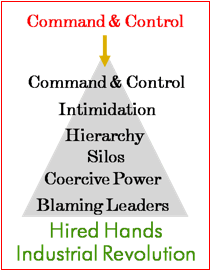Servant leadership is a practical philosophy supporting people who serve others first, in their life and work, and through their humility amazing business results follow. As a way of expanding that service to individuals and institutions, they choose to lead, whether in a formal position or not. In either capacity, they encourage collaboration, trust, foresight, listening, and the ethical use of power.
Servant-leaders seek to make lives and careers better for their teams, organizations, and vendors, not just themselves, and they have the courage to become the change they wish to see in the world.
Servant-Leaders and Servant-Led organizations historically outperform organizations that embrace “command and control” leadership styles. The old, heavy handed, style of leadership creates leaders that rely on fear tactics and excessive control to achieve results. This might work to some extent while the leader is watching, but the consequences of this leadership style are unmotivated employees, resentment towards management, and employees that don’t grow their personal skills.


Servant leadership however creates an environment of empowerment. As formal leaders their role is to support the needs of their teams and organizations and provide all necessary resources/ tools and information for their people to do their best work. Servant-leaders build trust with Employees through collaboration, motivation, and open communication. Once a high-trust culture is achieved, teams operate at an extraordinarily high level and remarkable business results follow.
 I have always believed that the best leader is the best server. And if you’re a servant, by definition, you’re not controlling.
I have always believed that the best leader is the best server. And if you’re a servant, by definition, you’re not controlling.– Herb Keller, Former Chairman, Southwest Airlines

